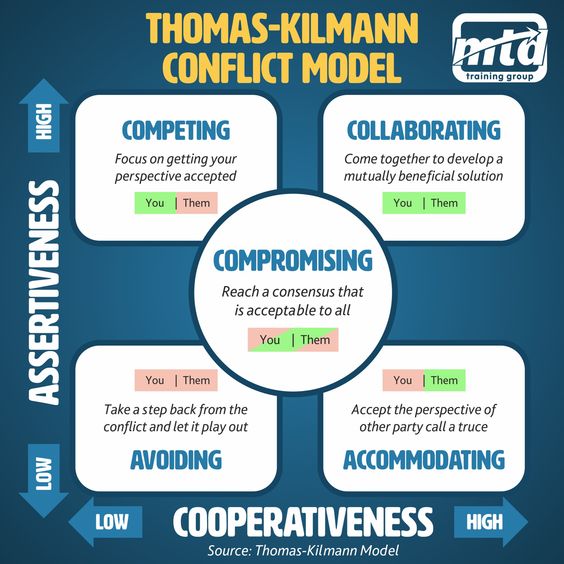CONFLICT RESOLUTION
CONFLICT RESOLUTION
Conflict resolution refers to the process of addressing and resolving disputes or disagreements between parties in a constructive and mutually satisfactory manner. It involves identifying the underlying issues, understanding the perspectives of all parties involved, and finding a solution that satisfies everyone's interests.
Communication: Effective communication is key to resolving conflicts. Encouraging open and honest dialogue between the parties involved allows them to express their concerns, interests, and perspectives. Active listening is essential to ensure that all parties feel heard and understood. By fostering clear and respectful communication, misunderstandings can be clarified, and common ground can be identified, paving the way for a resolution.
Negotiation: Negotiation involves bargaining and seeking compromises to reach a mutually acceptable agreement. This strategy requires the parties to identify their priorities and interests and then work together to find a solution that meets as many of those interests as possible. Negotiation often involves give-and-take, where each party may need to make concessions in order to move towards a resolution. Skilled negotiation can help to bridge differences and find mutually beneficial outcomes.
Conflict Coaching: Conflict coaching involves working with individuals involved in a conflict to help them understand and manage their emotions, perceptions, and communication strategies. A conflict coach provides guidance and support to help individuals develop constructive ways of addressing the conflict and finding solutions. Through coaching, individuals can gain insight into their own role in the conflict and learn effective strategies for resolving disputes in the future.
Problem-Solving: Problem-solving approaches focus on identifying and addressing the underlying issues that are fueling the conflict. This strategy involves analyzing the root causes of the conflict and brainstorming potential solutions. By adopting a collaborative problem-solving mindset, the parties can work together to develop creative and sustainable solutions that address the underlying concerns. Problem-solving strategies often emphasize teamwork, innovation, and a commitment to finding win-win outcomes.
Emotional Intelligence: Emotional intelligence involves understanding and managing one's own emotions and empathizing with the emotions of others. By cultivating emotional intelligence, individuals can develop self-awareness, self-regulation, social awareness, and relationship management skills that are essential for resolving conflicts constructively. Emotionally intelligent approaches to conflict resolution focus on maintaining composure, managing conflict triggers, and fostering empathy and understanding among the parties involved.
You are the in charge for male medical ward and you notice that two members of staff are not in talking terms. You therefore decided to resolve the problem.
TASK – Define conflict resolution. Describe three (3) conflict resolution strategies that may be used to settle the matter.
MARKING KEY – CONFLICT RESOLUTION
DEFINITION: Conflict is an expressed struggle between two interdependent parties, who perceive incompatible goals, scarce rewards, and interference from the other party in achieving their goals.(1 Marks)
WIN – LOSE; this strategy is characterized by attempts of one individual to control or dominate another so as to obtain his/her own goal(s) even at the expense of another’s goal(s) (3 Marks)
LOSE-LOSE STRATEGY: In lose-lose conflicts both parties try to win over the other but both end up losing to each other. Neither person’s goals are achieved.(3 Marks)
WIN-WIN STRATEGY-The win-win strategy is an approach that allows both individuals to feel they have accomplished all and part of their goals. This strategy tries to satisfy mutual needs, to solve problems creatively, and to develop relationships. (3Marks)





.jpg)
Comments
Post a Comment